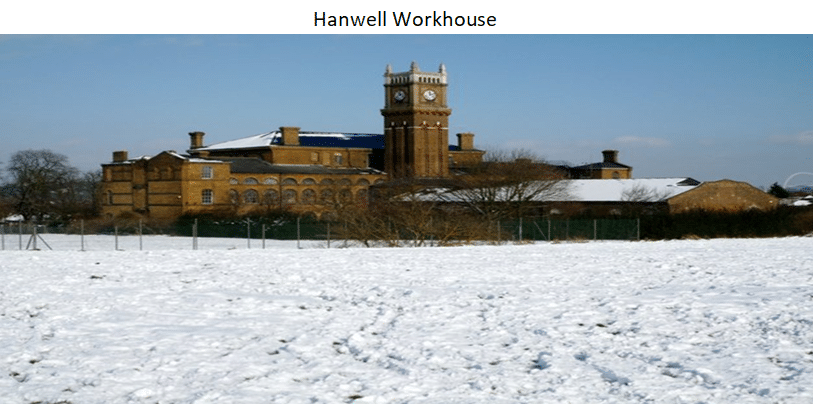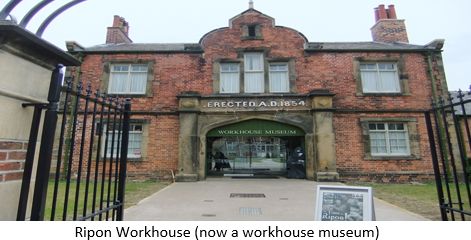The Workhouse Part 2
 31
31Jan

In our last workhouse blog we discussed why people found themselves in the workhouse. Now, let’s discuss a few of the types of workhouse records you might find for your ancestors and what information the records might give you.
Workhouse Records-Part 2
- Admission and discharge records: These records will tell you the name and age of the person in the workhouse, prior address, marital condition, occupation and whether they were capable of working.

- Apprenticeship papers: These records may give you parents’ names and conditions, as well as the apprentice’s name. Poor George Goullee, shown below, has a mother listed as deceased and a father listed as insane, and it also shows where the father was being kept.

- Hospital admissions records: These vary in detail but may show age, address, type and duration of illness, etc.
- School records: They may show details of the child’s name and age, parents’ names, addresses, etc.

- Creed registers: Workhouses kept track of the religion of the inmates, which might provide a clue for further research.
- Baptism records: Many baptisms for babies from the workhouse show no father’s name. The illustration below shows 3 entries on a page where every child is without a named father.

There are other types of records available for workhouse life and listings, and they vary in content and availability depending on location.
Knowing that there are many reasons for workhouse life, and that your ancestor or relative may have spent time in the workhouse, let’s look at where to find workhouse records:
- The primary resource to review for all things relating to the workhouse, including locations of workhouses, design of workhouses, daily schedules, menus, rules and more, should be the website workhouses.org.uk. This is the ultimate website for information about the workhouse and it even includes an online museum for a virtual workhouse tour.
- Websites:
- ancestry.com has many workhouse collections:
- Good collections from Cornwall and many records for London.
- Another interesting collection at ancestry.com is “England and Wales, Long-Term Workhouse Inmates, 1861.” On 29th June 1860, the House of Commons ordered the recording of every adult pauper in each workhouse in England and Wales, who had been an inmate for a continuous period of 5 years or more. The report was printed on 30 July 1861 and listed 14,216 adults.
- Also, check under other designations, for example:
- London, England, Poor Law Hospital Admissions and Discharges, 1842-1918
- Dorset, England, Poor Law Apprenticeship Records, 1623-1898
- London, England, Poor Law School District Registers, 1852-1918
- findmypast.com also has resources for workhouse inmates:
- An A-Z search for the word “workhouse” shows 22 results, including some coverage for Wales.
- Searching under the titles “Poor Law” shows 12 more results, including some for Ireland.
- Don’t forget to search familysearch.org. A catalog Keyword search for workhouse shows 882 results, such as:
- Admission and discharge register, 1772-1870 for the Westminster Union Workhouse
- Admission and discharge, birth, death and religious creed registers for the workhouse at Sheppey, 1853-1930
- Chorlton Union workhouse and hospital registers at Withington, 1857-1949
- Workhouse records, 1837-1929 Abergavenny Union Workhouse
- Workhouse Chapel at Liverpool, baptism registers, 1831-1928; If you had relatives in Liverpool and you can’t find a baptism, this would be worth checking.
- familysearch.org also has some coverage of workhouses in Scotland.
- A great resource for workhouse research is The National Archives (TNA) of England and Wales. This website has good information regarding websites and links on workhouses and to all the information and materials held at the National Archives. You will also find a very helpful research guide: http://www.nationalarchives.gov.uk/help-with-your-research/research-guides/workhouse/
- ancestry.com has many workhouse collections:
- Newspapers can be another great resource for information regarding workhouses: britishnewspaperarchive.co.uk or the newspaper collection on www.findmypast.com may help you find more about your ancestor.
Now for a look at an example of a workhouse, its purpose and who might have lived and worked there:

Growing up in the suburbs of London, the workhouse closest to my home was Hanwell Workhouse, also called Hanwell School. This workhouse school was only a mile away from my home when I was a child, and although it was no longer functioning as a workhouse during my lifetime, the buildings still stood and we all knew it to be the workhouse where Charlie Chaplin had lived as a child.
Hanwell Workhouse was built on the land of Cuckoo Farm on Cuckoo Hill in 190 acres of the community of Hanwell, now a suburb of London. Twenty acres were kept as a working farm. From 1857 to 1933 it functioned as a boarding school for up to 1,200 poor and disadvantaged boys and girls. The building is the only Victorian Poor Law School now standing in London and is now a community center. The history of Hanwell Workhouse shows some interesting details of life at a workhouse school. The workhouse was nearly self-sufficient, with a well, their own sewage system, hospital, dairy and farm. Thus, this workhouse employed far more than caretakers. They had teachers, blacksmiths, people to look after the animals, a tailor, shoemaker, gardeners, engineers, etc. Might your ancestor have been involved with a workhouse as an employee? Your ancestor may have had workhouse connections without being an inmate. Records may be found for nurses, cooks, wardens and more. Look for Board of Guardian records for information about your ancestor who worked in the workhouse.
Remember that there were more than 6,000 workhouses set up in England and Wales. A search for your ancestors and relatives may be a long and challenging search, but a richer knowledge of their lives and trials will be very rewarding.
At Price Genealogy we have over forty years of experience helping people with the unique challenges of their family history, including research beyond baptisms, marriages and burials.
Lindsey
Have you had any experience with workhouse records? Let us know in a comment below!
